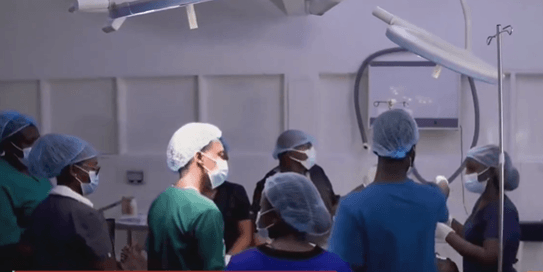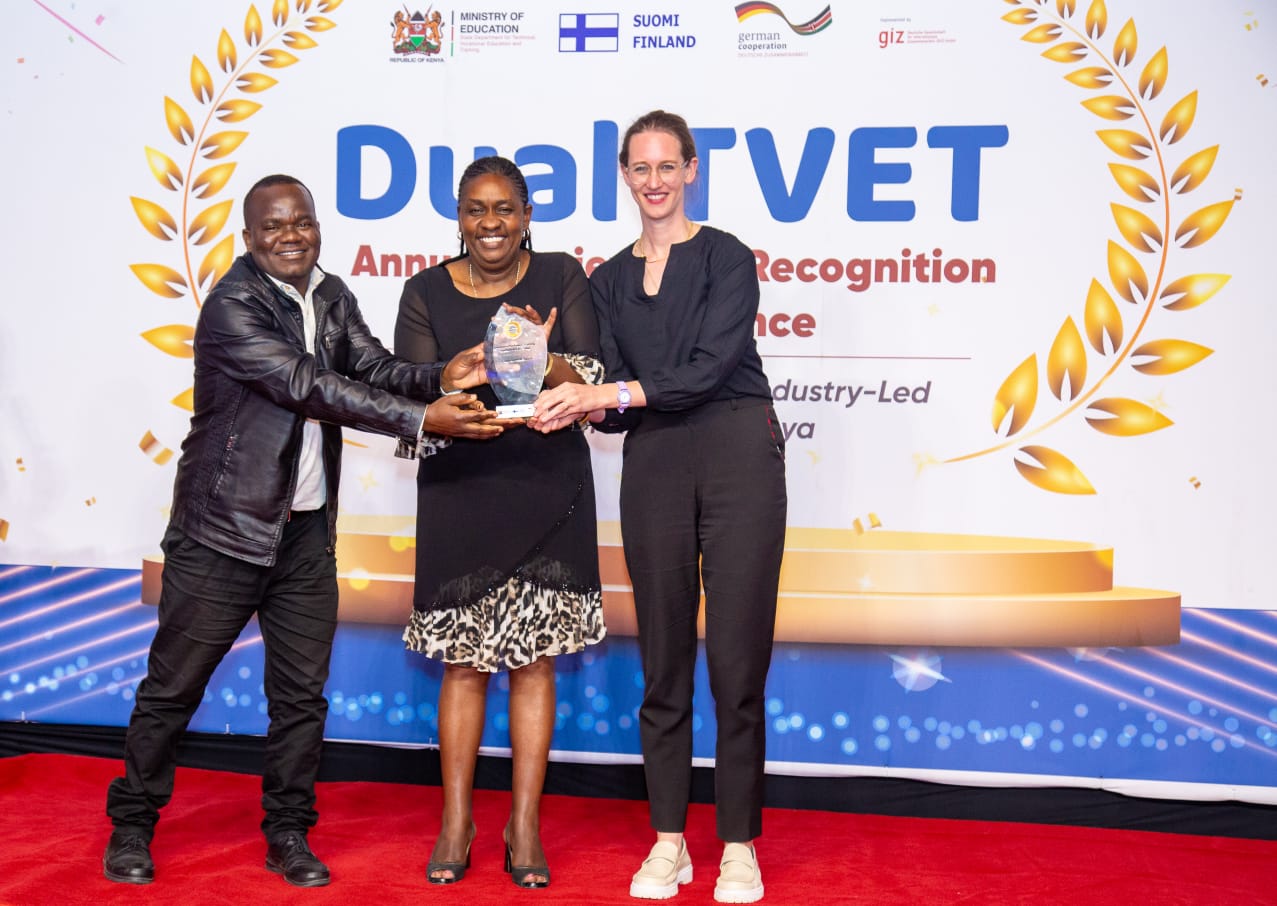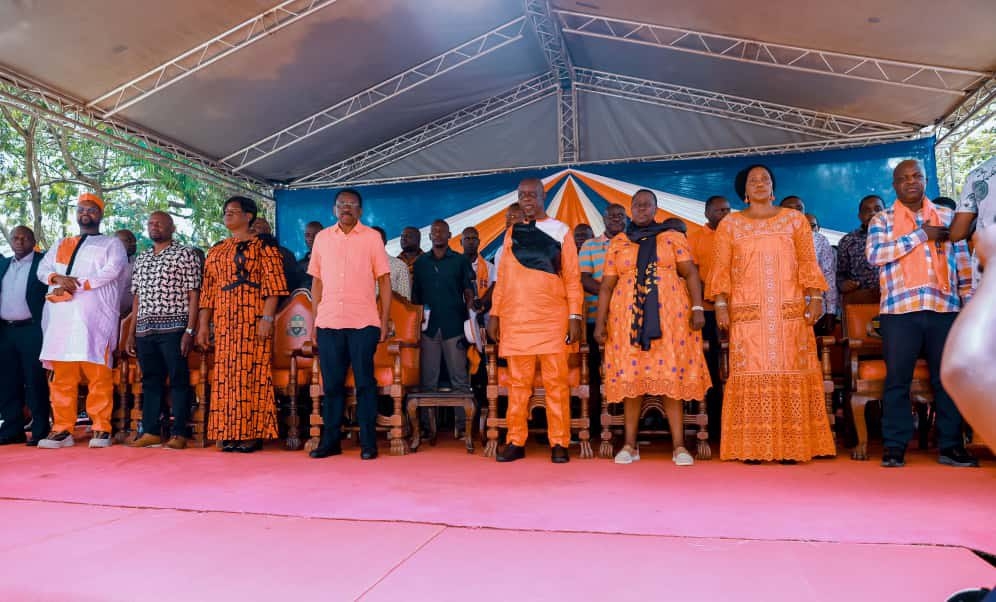

The Machakos Technical Institute for the Blind (MTIB) was
among the top 14 Technical and Vocational Education and Training (TVET)
institutions recognized for excellence in driving skills, innovation, and inclusivity
in the TVET sector.
MTIB emerged as the best institution in the Women in STEM and
Inclusivity Award category.
Speaking during the recognition ceremony, Dr. Nduku Mutua,
Chief Principal at MTIB, lauded the initiative as a transformative partnership
that has redefined the training landscape for special-needs learners.
“This recognition is a testament to our commitment to
inclusive, practical, and gender-sensitive technical education. Through the
dual training model, our learners — including women and persons with
disabilities — are gaining not just academic knowledge but real skills that
prepare them for meaningful employment and entrepreneurship,” said Dr. Nduku.
The 14 TVET institutions were celebrated during the Dual
TVET Mid-Term Project Review and Recognition Gala held in Nairobi.
The event honored excellence and innovation among
institutions implementing the Dual Training approach, a model that combines
classroom instruction with structured industry experience.
The dual training model is revolutionizing Kenya’s technical
training sector by aligning skills development with market needs.
This recognition was part of the Promotion of Youth Employment
and Vocational Training Programme, a flagship initiative jointly funded by the
Governments of Finland and Germany, and spearheaded by the State Department for
Technical, Vocational Education and Training (TVET) with technical support from
the Deutsche Gesellschaft für Internationale Zusammenarbeit (GIZ).
Dr. Esther Muoria, Principal Secretary, State Department for
TVET, congratulated the winners and commended the growing synergy between TVET
institutions and industries.
“Dual TVET is more than a training model. It is a bridge
from potential to purpose — from the classroom to the career,” she said.
“This approach turns
learning into livelihood and trainees into trusted professionals. It is
transforming our youth into job creators, not job seekers, and proving that
when education meets industry, Kenya’s future is unstoppable.”
Friederike Hemker, Deputy Head of Development Cooperation at
the German Embassy, commended Kenya’s progress in embedding dual training
within its TVET system.
“When I recently met young plumbing trainees at PC Kinyanjui
Technical Training Institute, I saw Dual Training in action — young people
learning by doing, with confidence and pride,” she said.
Hemker added that the progress in dual training is evident
through stronger partnerships between TVET institutions and companies,
confident trainees, and industries ready to invest in young talent.
“Your efforts are driving real change and positioning Kenya
as a regional leader in skills development and innovation,” she said.
On his part, Matts Wuerlander, Counsellor for Skills
Development and Job Creation at the Embassy of Finland, lauded TVETs and
industries for their strong collaborations.
“Finland is proud to be part of Kenya’s remarkable Dual
Training journey. Together, we have exceeded our programme targets and
demonstrated what true collaboration can achieve — partnerships that deliver
results and empower young people with practical, employable skills,” he said.
Over the years, MTIB has forged partnerships with local
industries and organizations to ensure learners gain hands-on experience in
sectors such as ICT, entrepreneurship, electrical and electronic engineering,
business studies, and crafts.
The institution also provides adaptive technologies such as
Braille-based learning materials, tactile diagrams, and digital screen readers
to make technical education accessible and effective for all.
Dr. Nduku emphasized that the dual training approach has
bridged the gap between education and employment for MTIB graduates.
“Our collaboration with industry players ensures that
learners are exposed to the real demands of the job market. We have seen
remarkable results — our graduates are being absorbed faster, and many are now
running their own enterprises,” she noted.
In addition to being recognized for excellence in dual
training, MTIB also received the Women in STEM Inclusion Award, acknowledging
the institution’s outstanding efforts in promoting gender equity and inclusion
in science, technology, engineering, and mathematics (STEM).
The award celebrates MTIB’s initiatives that empower women —
especially those with visual impairments — to pursue careers in STEM-related
fields traditionally dominated by men.
Through mentorship programs, targeted training, and
accessible digital resources, the institution has opened pathways for women to
thrive in technology and innovation.
“Empowering women in STEM is not just about equality; it’s
about unlocking untapped potential,” said Dr. Nduku.
“We are proud that women at MTIB are excelling in fields
like ICT and engineering. Their success stories are changing perceptions about
disability and gender in technical education.”
Under Dr. Mutua’s leadership, MTIB has invested in digital
learning tools and inclusive infrastructure to ensure that women with
disabilities can fully participate in scientific and technical learning.
The institution’s Smart Learning Hub — a digital center
equipped with assistive technologies — serves as a vital resource for visually
impaired learners to access research materials, coding software, and innovation
platforms.
At the same time, MTIB was recognized as one of Kenya’s top
TVET institutions specializing in special needs education and inclusive
technical training.
The accolade followed a national research study conducted by
Timely Kenya, an education and research consultancy, which released its
findings on October 7, 2025.
The survey, which sampled over 150 public and private TVET
institutions across the country, assessed performance based on key indicators
such as training quality, inclusion, industry collaboration, dual training
models, mentorship, sustainability, and graduate employability.
MTIB emerged among the leading institutions, earning praise
for its commitment to empowering visually impaired learners with technical and
vocational skills that meet Kenya’s evolving labor market needs.







![[PHOTOS] Council of Governors visits Raila's grave](/_next/image?url=https%3A%2F%2Fcdn.radioafrica.digital%2Fimage%2F2025%2F10%2F59c8111a-6f0d-4719-8587-7e965c4bdd34.jpg&w=3840&q=100)





